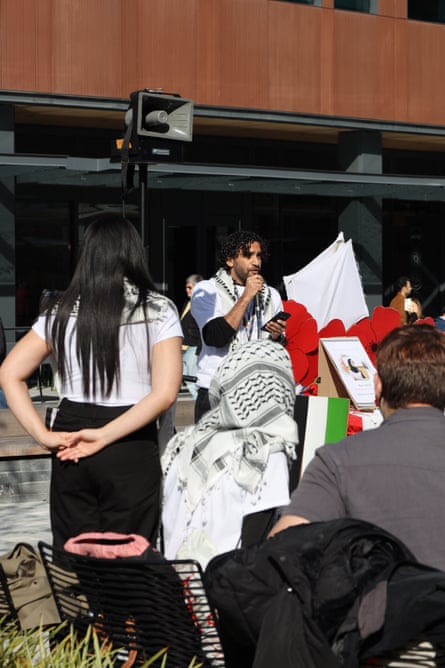Two Microsoft employees who were fired last week after organizing a vigil for Palestinians killed in Gaza say the company retaliated against them for their pro-Palestinian activism.
The two, Abdo Mohamed, a researcher and data scientist, and Hossam Nasr, a software engineer, organized the event outside Microsoft headquarters in Redmond, Washington, on 24 October. They were fired later that evening.
“Microsoft really crumbled under pressure, internally and externally, to fire me and to shut down and retaliate against our event, not because of policy violations, simply because we were daring to humanize Palestinians, and simply because we were daring to say that Microsoft should not be complicit with an army that is plausibly accused of genocide,” said Nasr, who has been criticized on social media and in internal Microsoft employee communication groups over his support for Palestine.
Both employees were members of No Azure for Apartheid, a group of Microsoft workers protesting the company’s sale of its cloud computing technology to Israel.
The group demands Microsoft sever all Azure contracts and partnerships with the Israeli military and government, disclose all ties with Israel, call for an immediate and permanent ceasefire in the conflict in Gaza, and protect and uphold the free speech of employees.

Microsoft denied that the two, who are originally from Egypt, were fired for their activism. “We remain dedicated to maintaining a professional and respectful work environment and provide many avenues for all voices to be heard. But, importantly, we ask that this be done in a way that does not disrupt business operations and be aligned to our company policies and behavior expectations,” a spokesperson said.
“We do not permit employees to use devices like bullhorns and speakers in public areas to disrupt the work of their colleagues. We were clear about our policies in advance with the event organizers and instructed that this gathering take place on public property. The organizers chose to disregard this guidance and were terminated.”
But Mohamed and Nasr reject allegations that the vigil was disruptive and claim it was in accordance with Microsoft policies. They say that the event, which sought to raise money for humanitarian efforts in Gaza, followed the same procedures as other employee charity events regularly held by other employee groups. The vigil was set up outdoors during lunchtime on the Microsoft headquarters campus, with a microphone for speakers and some chairs and signs set up for attenders.
According to No Azure for Apartheid, more than 200 employees attended the vigil in person and virtually.
Nasr and Mohamed both claimed they were in communications with Microsoft ahead of time, and addressed any concerns that were brought up before the lunchtime event, the purpose of which they said was to honor Palestinian lives lost in the conflict and call attention to Microsoft’s ties to Israel. They said police were called to the event but only observed it, and that only a microphone for speakers was used.
“They never at any point said that termination was on the table or even the disciplinary consequences were on the table,” Nasr told the Guardian.
They both questioned how it happened that Nasr’s dismissal was publicized by the group Stop Antisemitism before they themselves were notified they had been fired. Nasr provided a call log showing he received a call from Microsoft at 9pm on 24 October, while the group posted on social media that Nasr was “no longer with Microsoft” an hour and a half earlier.
Nasr also alleged a double standard at the company, arguing that he had experienced repeated internal investigations and reprimands for comments about Gaza that he had posted on Microsoft internal employee groups, while posts he flagged internally for racism or personal attacks against him did not result in any disciplinary actions.
He pointed to posts insinuating he and another employee are “members of Hamas or just supporters”. As far has he knows, these never resulted in investigations. He also said HR opened an investigation into a post of his that said: “With or without your sympathy, Palestinians will attain the dignity, the freedom, the respect, and the liberation that they deserve, everywhere from the Jordan.” However, he reported, the company did not act when another employee wrote: “From the river to the sea, Israel will always be.”
A Microsoft representative declined to comment on the specific examples.
The No Azure for Apartheid group characterized the firings as retaliatory and alleged Microsoft has engaged in intimidation toward Palestinian voices. The group disputed Microsoft’s claims of policy violations by the employees and is calling for their reinstatement and an explanation for the leak of their termination before the employees were themselves notified.
A Palestinian employee at Microsoft who requested to remain anonymous for fear of retaliation told the Guardian that Microsoft’s internal message board has been full of messages in recent days expressing anger at the firings. They also accused Microsoft of double standards when it comes to enforcing harassment and behavior policies toward Palestinian voices.
“It was unjust and very intentional as a message to the community to silence the loudest voice in our community,” said another Palestinian worker at Microsoft who requested to remain anonymous.
A spokesperson for Microsoft did not comment on the ‘No Azure for Apartheid’ campaign, its demands, or allegations of bias.
The spokesperson added the company was investigating the allegation that a social media post about the terminations was published by Stop Antisemitism before the employees were informed.
A report by the Israeli-Palestinian outlet +972 Magazine reported that the Israeli military has increased the purchase of services from Microsoft Azure since October 2023 and for years it had been the main cloud service provider for Israel. The company has also funded several Israeli startups that provide services to the military.
“Microsoft is refusing to hear its worker demands,” said Mohamed. “This is what’s happening within Microsoft. People are calling them out, and they’re even refusing to engage and look at serious concerns that come with the use of these technologies.”
US tech firms who do business with Israel have faced rising unrest internally in the last year. In April, Google fired more than 50 workers in response to a protest over the company’s military ties to the country.

.png) 2 months ago
19
2 months ago
19













































